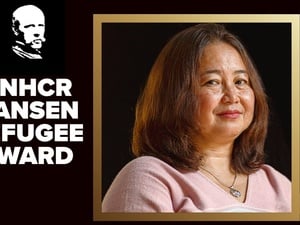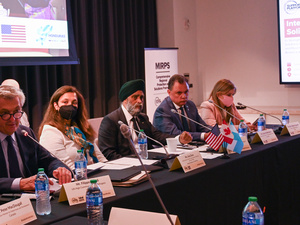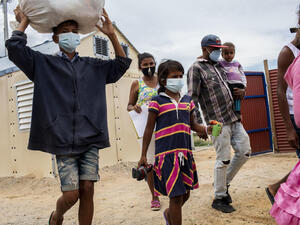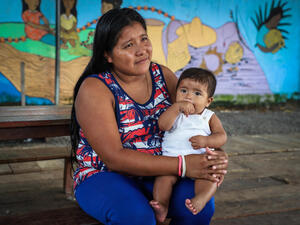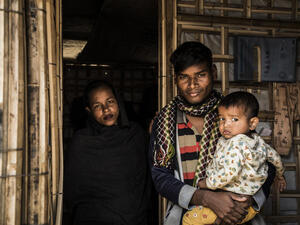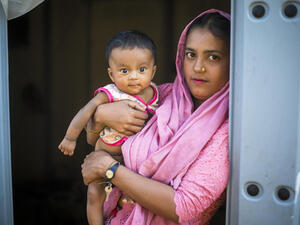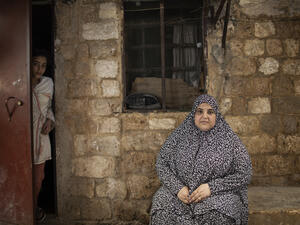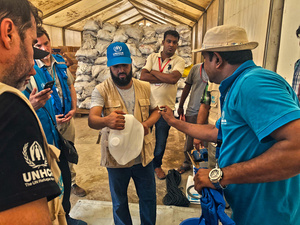UNHCR granted $5m to fight HIV/AIDS in Africa's Great Lakes region
UNHCR granted $5m to fight HIV/AIDS in Africa's Great Lakes region

AIDS education in a primary school in Uganda. Messages on prevention and treatment must be consistent across refugee and host communities to effectively combat the epidemic.
GENEVA, March 17 (UNHCR) - Refugees, returnees and host communities in six African countries stand to benefit from improved HIV prevention and AIDS treatment programmes under a new World Bank grant for the Great Lakes Initiative on HIV/AIDS (GLIA) to fund innovative cross-border, sub-regional responses to the epidemic.
This week, the World Bank approved a $20 million grant to help the GLIA countries - Burundi, Democratic Republic of the Congo (DRC), Kenya, Rwanda, Tanzania and Uganda - step up the fight against HIV/AIDS. The project is a joint effort by the World Bank, UNAIDS Secretariat, UNHCR and governments in the region through their national AIDS programmes.
"GLIA is a new regional organisation, fully-owned, and will be operated by its six member countries. Designed to deal with HIV/AIDS operational issues as well as policy, the coming together of these countries to fight a common enemy - the HIV virus - is a historic event for the Great Lakes region, their people, and for the World Bank," said Richard Seifman, Project Co-Task Team Leader and a Senior Advisor in the World Bank's AIDS Campaign Team for Africa.
Programmes for refugees, returnees and surrounding communities make up the biggest component of the grant, with $8 million dedicated to these communities over four years. The UN refugee agency will receive $5 million of these funds for its work with refugees and returnees in the six countries, while the remaining $3 million will supplement countries' existing World Bank grants for work with local host populations.
"So far, governments and the international community have mainly been attacking this epidemic through a country-by-country approach. Too often, refugees and returnees who move across borders are seen by both countries as 'not our problem', and the epidemic is allowed to continue," explains Dr. Paul Spiegel, UNHCR's expert on HIV and AIDS. "These funds will help us tackle the problem from a cross-border perspective and make sure that people uprooted by conflict don't fall through the cracks."
The sub-regional approach will help to ensure continuity of care when refugees return home. Burundian refugees in camps in Tanzania, for example, have benefited from programmes to prevent the transmission of HIV from mother to child. Tens of thousands of these refugees are now returning home, and the funds from the World Bank grant will help to ensure that similar services will be available in areas of return in Burundi.
The cross-border approach will also tap the new HIV skills refugees have learned in the host country to contribute to their own countries upon return.
"In many refugee settings, UNHCR has trained refugee nurses, doctors and community health workers on HIV prevention and awareness and AIDS care and support. These are skills that can later benefit the country of origin as well," says Spiegel.
UNHCR is identifying returnees going back to Equateur province in the DRC who have undergone such training while they were refugees and who can now be valuable resources back home.
The $5 million from the grant allocated to UNHCR will also improve and expand existing HIV programmes and make them more comprehensive. The exact projects to be funded by the grant depend on the specific needs in each operation. In Kenya, for example, the funds will support ongoing programmes in voluntary counselling and testing and prevention of mother-to-child transmission in refugee camps.
With funding from an advance preparatory GLIA grant from the World Bank, UNHCR and the governments have conducted field trials of modified HIV behavioural surveillance surveys in Kenya and Rwanda, with the surveys conducted simultaneously in refugee and surrounding populations. The innovative surveys have adapted standard questions to specifically take into account the factors of displacement and the interaction between host communities and refugees. The grant money will allow UNHCR and the governments to extend these surveys to cover all six countries in the first year. The results will help better target and integrate interventions to meet the needs of the refugees and host populations.
In all six countries, UNHCR and the governments will carry out joint training of health workers in camps and local communities. In Rwanda, UNHCR plans to train and develop peer educators from both the refugee population and the surrounding communities to ensure that consistent messages on prevention and treatment are conveyed throughout refugee-affected areas.
"If you have different messages and different treatment approaches in the refugee camps and the host communities, that will affect transmission of the virus, because these groups do interact," explains Spiegel. "You have to have a similar approach across the board to most effectively combat the epidemic."
Discrimination is another key area that the funds will help address. Spiegel notes that in refugee settings, often both groups - refugees and local communities - have incorrect and unjust perceptions that the prevalence of HIV is higher in the other group. UNHCR plans to try to reduce these myths through joint meetings and awareness programmes bringing together refugees and members of the host communities.
While the funds from the grant itself will be put into action later this year, the process leading up to the project has already borne fruit. Over the several years of planning for the project, the World Bank, UNAIDS Secretariat, UNHCR and national AIDS Control programmes have begun working much more closely together and building bridges among the different agencies.
In addition to the funds for refugee- and returnee-affected areas, GLIA has three other components: Support to HIV and AIDS-related networks; harmonizing regional HIV and AIDS-related health sector policies and protocols across the six countries; and management, capacity strengthening, monitoring, evaluation and reporting.
By Jennifer Clark
UNHCR Geneva


